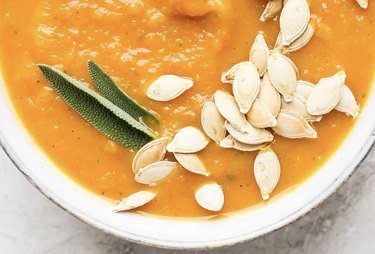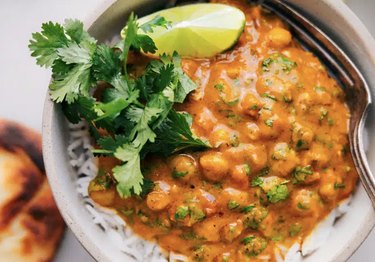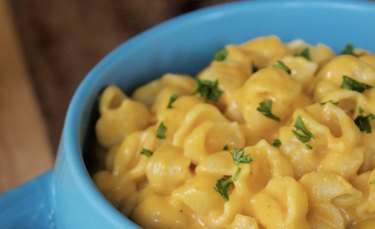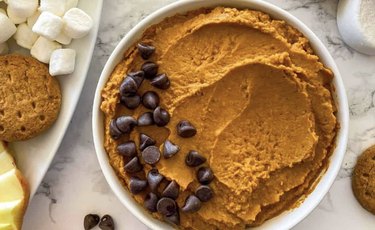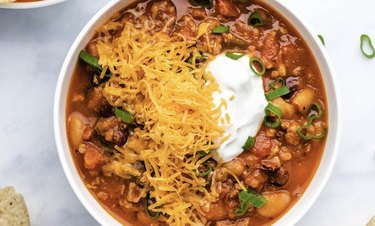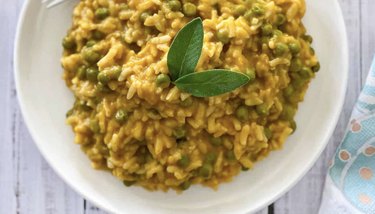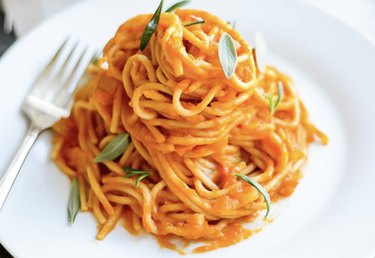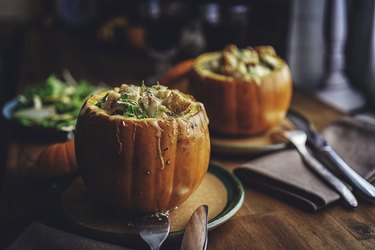
Pumpkin conjures up feelings of fall and all things warm, sweet and, yes, even spicy — PSLs are still very much still a thing.
But, much like other fruits and vegetables, you can actually enjoy pumpkin year-round by using canned pumpkin, or, at least what we call canned pumpkin. Canned pumpkin may include pumpkin, but it can also include (and it often does) a mixture of other squashes, according to the FDA.
Video of the Day
Video of the Day
Canned pumpkin's unique flavor also offers flexibility: You can go the sweeter route by making pies, pancakes, muffins and lattes or you can skew savory and create dishes by pairing the ingredient with vegetables, cheeses and meats.
The latter is a great way to reap the nutritional benefits of pumpkin (and there are many) without overdoing it on the sweet stuff, i.e. added sugar.
A cup of canned pumpkin has 85 calories, almost zero fat, 20 grams of carbohydrates, 7 grams of fiber, 8 grams of natural sugar (make sure you're not using canned pumpkin pie filling) and almost 3 grams of protein, per the USDA.
The squash is also loaded with iron, potassium, magnesium, copper, manganese, vitamin A, vitamin C, riboflavin, vitamin E, vitamin K and beta-carotene, per the USDA.
To expand your range of pumpkin recipes, we've pulled together seven of our favorite savory dishes, all including canned pumpkin as an ingredient.
1. Pumpkin Soup
Pair a bowl of this soup from the blog Feel Good Foodie with a piece of crusty bread to help soak up all of the goodness. Here, the canned pumpkin is added to the broth to give it a thicker, more filling, consistency.
The mix of vegetables — carrots, onion, celery and pumpkin — gives this simple soup a hefty dose of vitamins, minerals and fiber. You can even add ground turkey or white beans for a source of protein. Even though it's on the lighter side, it still has about 6 grams of protein per serving to help keep you satisfied.
Get the Pumpkin Soup recipe and nutrition info here.
2. Pumpkin Curry
Curry comes in many different flavors and variations — including pumpkin! This particular pumpkin curry from the blog Chelsea's Messy Apron is a nutritious, vegetarian meal that can be enjoyed on top of rice or potatoes.
The canned pumpkin helps make up the curry sauce base, which is also made with coconut milk and spices like traditional curries. You can add meat to this recipe if you'd like, but the chickpeas are enough to provide healthy fats, fiber and protein. Chickpeas and pumpkin are also especially low saturated fats.
And saturated fat is linked to a greater risk of heart disease, according to the U.S National Library of Medicine.
By using canned pumpkin as the curry base, you're keeping it plant-based, high in healthy fats and packed with protein (16 grams).
Get the Pumpkin Curry recipe and nutrition info here.
3. Crockpot Express Pumpkin Mac and Cheese
A creamy mac and cheese that's good for you? You're not dreaming — this pumpkin mac and cheese from the blog Crockpot Ladies is rich and creamy like the regular stuff, but a touch healthier.
We know canned pumpkin is high in fiber. And while the recipe calls for regular pasta shells, you can use whole-wheat shells instead to up the fiber content even more. Plus, you'll use less cheese when you add pumpkin puree, so less fat and cholesterol.
Turns out, about 95 percent of Americans don't eat enough fiber on a daily basis, as stated in a January 2017 paper in American Journal of Lifestyle Medicine, so every little bit counts. You could add chopped broccoli to this dish to increase the servings of vegetables and add more fiber, too.
Get the Crockpot Express Pumpkin Mac n Cheese recipe and nutrition info here.
4. Pumpkin Spice Hummus
Hummus on its own is creamy and delicious and, of course, nutritious. But by adding canned pumpkin, you're taking it to another level.
This hummus recipe from the blog This Healthy Kitchen calls for tahini and molasses to give it a rich, warm flavor. It also calls for all sorts of toppings, even pepitas — the tiny green seed found inside of a white shell, aka pumpkin seeds.
Pepitas and chickpeas, in particular, have phytosterols, a compound found in plants that have a similar structure to cholesterol, which is a type of fat found only in animal products.
Because they have similar structures, phytosterols actually block the absorption of cholesterol in the body, according to Oregon State University's Linus Pauling Institute.
Get the Pumpkin Spice Hummus recipe and nutrition info here.
5. Pumpkin Turkey Chili
It's the canned pumpkin that adds creaminess to this chili recipe from the blog The Recipe Well, while still keeping it dairy-free (save for the toppings). Chili is also a hearty way to get vitamins, protein and fiber in one meal.
While this recipe calls for using the instant pot, you can also use a crockpot or stove top to make this chili. It also calls for several different spices, like chipotle chili powder and smoked paprika, which are optional if you don't want heat.
Get about 35 grams of protein, 16 grams of fiber and 148 milligrams of calcium from this rich, warming chili.
Get the Pumpkin Turkey Chili recipe and nutrition info here.
6. Vegan Pumpkin Risotto
This risotto dish from the blog This Healthy Kitchen is pumpkin-based, making it an obvious choice for a savory fall dish — but the peas and coconut milk make it light and perfect for the summertime, too.
Peas has protein, a type of plant protein that's great for vegans or vegetarians. But anyone can enjoy this dish, even as a side at your Thanksgiving meal. The peas and pumpkin also have plenty of prebiotic fiber, which is great for your good gut bacteria.
When you eat peas, in particular, short-chain fatty acids are created, including a specific type called butyrate. Preliminary research, as described in a February 2018 review in Advances in Nutrition, links butyrate to promoting a healthy gut barrier, reducing inflammation and maintaining homeostasis through the gut-brain axis.
Get the Vegan Pumpkin Risotto recipe and nutrition info here.
7. Pumpkin Pasta Sauce
Pasta sauce is great because it's an easy and delicious way to get more veggies in your diet. By adding canned pumpkin puree to the sauce, you're adding loads more nutrition (read: vitamin A, fiber, iron and more) but you're also adding a rich warmth to the dish as well.
A cup of this sauce from the blog Real Food Whole Life provides all of the vitamin A you need in a day. This vitamin is crucial for healthy vision and supporting our immune system. It's also needed to keep our lungs, heart and kidneys working properly, as explained by the National Institutes of Health.
Because vitamin A is a fat-soluble vitamin, adding olive oil, butter and cheese can help your body better absorb it from the sauce.
Get the Pumpkin Pasta Sauce recipe and nutrition info here.
- National Institutes of Health U.S National Library of Medicine: "Facts About Saturated Fats"
- American Journal of Lifestyle Medicine: "Closing America’s Fiber Intake Gap"
- Oregon State University Linus Pauling Institute: "Phytosterols"
- Advances in Nutrition: "Butyrate: A Double-Edged Sword for Health?"
- National Institutes of Health Office of Dietary Supplements: "Vitamin A Fact Sheet for Consumers"
- FDA: "CPG Sec 585.725 "Pumpkin" - Labeling Articles Made from Certain Varieties of Squash"
- USDA: "Pumpkin, canned, without salt"
- Feel Good Foodie: "Pumpkin Soup"
- This Healthy Kitchen: "Vegan Pumpkin Risotto"
- This Healthy Kitchen: "Pumpkin Spice Hummus"
- Real Food Whole Life: "Pumpkin Pasta Sauce"
- The Recipe Well: "Instant Pot Pumpkin Turkey Chili"
- Crockpot Ladies: "Crockpot Express Pumpkin Mac n Cheese"
- Chelsea's Messy Apron: "Pumpkin Curry"
